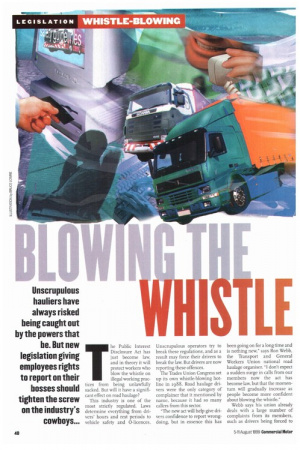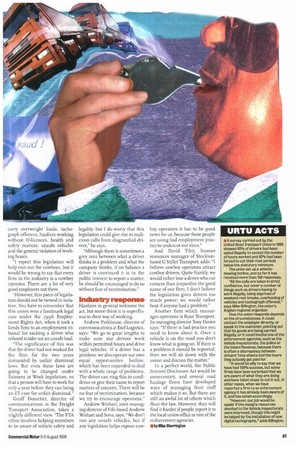S LE
Page 42

Page 43

If you've noticed an error in this article please click here to report it so we can fix it.
Unscrupulous hauliers have always risked being caught out by the powers that be. But new legislation giving employees rights to report on their bosses should tighten the screw on the industry's cowboys...
The Public Interest Disclosure Act has just become law, and in theory it will protect workers who blow the whistle on illegal working practices from being unlawfully sacked. But will it have a significant effect on road haulage?
This industry is one of the most strictly regulated. Laws determine everything from drivers' hours and rest periods to vehicle safety and 0-licences. Unscrupulous operators try to break these regulations, and as a result may force their drivers to break the law. But drivers are now reporting these offences.
The Trades Union Congress set up its own whistle-blowing hotline in 1988. Road haulage drivers were the only category of complainer that it mentioned by name, because it had so many callers from this sector.
"The new act will help give drivers confidence to report wrongdoing, bui in essence this has been going on for a long time and is nothing new," says Ron Webb, the Transport and General Workers Union national road haulage organiser. "I don't expect a sudden surge in calls from our members now the act has become law, but that the momentum will gradually increase as people become more confident about blowing the whistle."
Webb says his union already deals with a large number of complaints from its members, such as drivers being forced to carry overweight loads, tachograph offences, hauliers working without 0-licences, health and safety matters, unsafe vehicles and the general violation of working hours.
"I expect this legislation will help root out the cowboys, but it would be wrong to say that every firm in the industry is a cowboy operator. There are a lot of very good employers out there.
"However, this piece of legislation should not be viewed in isolation. You have to remember that this union won a landmark legal case under the 1996 Employment Rights Act, when it took a Leeds firm to an employment tribunal for sacking a driver who refused to take out an unsafe load.
"The significance of this was that the driver had not worked for the firm for the two years demanded by unfair dismissal laws. But even these laws are going to be changed under Fairness at Work legislation, so that a person will have to work for only a year before they can bring an FT case for unfair dismissal."
Geoff Dossetter, director of communications at the Freight Transport Association, takes a slightly different view. "The PTA ethos involves helping members to be aware of vehicle safety and legality, but I do worry that this legislation could give rise to malicious calls from disgruntled drivers," he says.
"Although there is sometimes a grey area between what a driver thinks is a problem and what the company thinks, if on balance a driver is convinced it is in the public interest to report a matter, he should be encouraged to do so without fear of recrimination."
Indusiry response
Hauliers in general welcome the act, but some think it is superfluous to their way of working.
Andrew Parkhouse, director of communications at Excl Logistics, says: "We go to great lengths to make sure our drivers work within permitted hours and drive legal vehicles. If a driver has a problem, we also operate our own equal opportunities hotline, which has been expanded to deal with a whole range of problems. The driver can ring this in confidence or give their name to report matters of concern. There will be no fear of recrimination, because we try to encourage openness."
Andrew Wishart, joint managing director of Fife-based Andrew Wishart and Sons, says: "We don't run any unsafe vehicles, but if any legislation helps expose cow
boy operators it has to be good news for us, because these people are using bad employment practice to undercut our rates."
And David Tiley, human resources manager of Stocktonbased G Stiller Transport, adds: "I believe cowboy operators attract cowboy drivers. Quite frankly, we would rather lose a driver who cut corners than jeopardise the good name of our firm. I don't believe the legislation gives drivers too much power; we would rather hear if anyone had a problem."
Another firm which encourages openness is Ryan Transport. Its managing director Tony Davies says: "If there is bad practice you need to know about it. Once a vehicle is on the road you don't know what is going on. If there is a problem it should be reported; then we will sit down with the union and discuss the matter."
In a perfect world, the Public Interest Disclosure Act would be unnecessary, and several road haulage firms have developed ways of managing their staff which makes it so. But there arc still an awful lot of others which flout the law. However, they will find it harder if people report it to the local union office or one of the enforcement agencies.
• by Mike Shei•rington








































































































